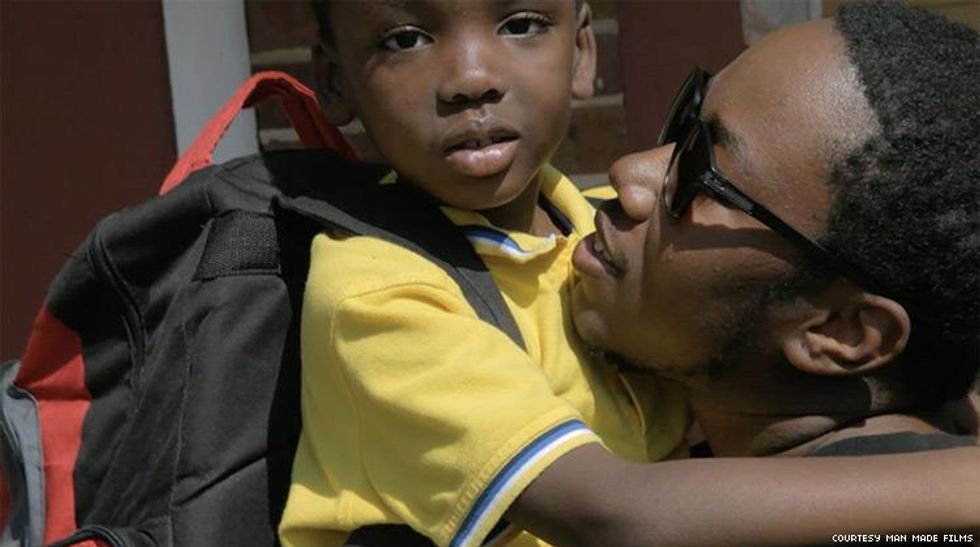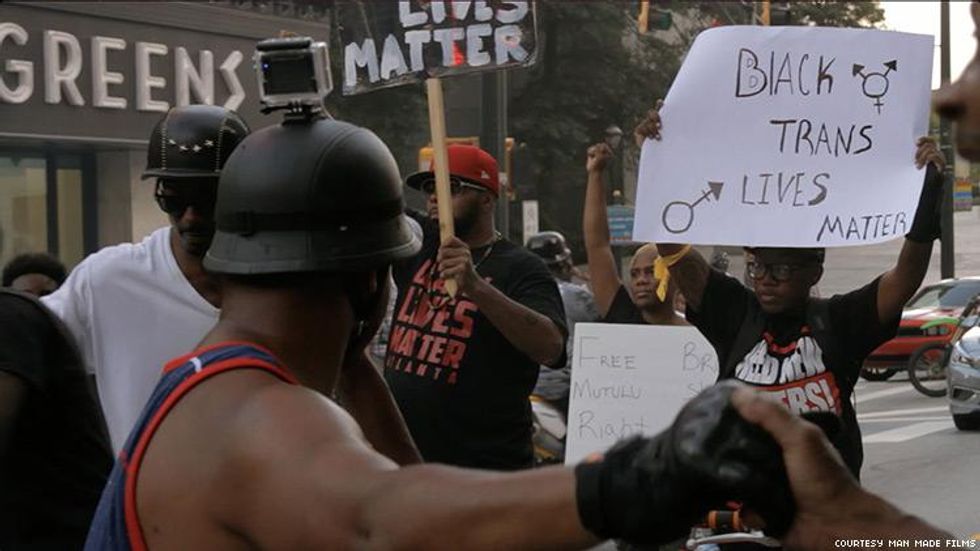Transgender
Unlikely Duo of Téa Leoni, T Cooper Team Up to Explore Trans Bodies

Bodybuilders -- and metamorphoses -- are at the center of the fascinating new doc Man Made.
June 13 2018 5:16 AM EST
By continuing to use our site, you agree to our Privacy Policy and Terms of Use.

Bodybuilders -- and metamorphoses -- are at the center of the fascinating new doc Man Made.
"For me, bodybuilding is a perfect metaphor for what we all do as humans, and especially as trans people," says T Cooper, director of the transgender men bodybuilding documentary Man Made. "We evolve. We change. We build the bodies and lives we want. And it's our unalienable right to build our bodies and lives however we want. I'm not personally a bodybuilder, but I can certainly relate to making all sorts of life decisions that help me have the body I want. And the life I want."
"I was taken with the whole metaphoric theme of making your body and creating your image to be how you see yourself," Tea Leoni, star of Madam Secretary, recently told Entertainment Weekly. "I met T years ago [but] had not heard him lit up like this about something, maybe ever. I knew the film had to be made and I knew he had to make it." Leoni signed on as an executive producer. The film also garnered support from Sundance.
The focus of Man Made is certainly bodybuilding and self-transformation as a whole, but more than that, it looks at how trans people evolve just as others do -- and how all our lives undergo natural metamorphoses. "The lives you see unfurling before you on the way to the bodybuilding competition, to me, are quite universal to the human experience," says Cooper. "Discovering where you came from, figuring out whether you can stay with a partner after going through a change -- of any kind -- together, seeking acceptance from parents, caring for a child, choosing partners, balancing ambition and family, keeping a roof over your head."
Focused on TransFitCon, the world's only transgender bodybuilding competition, Man Made is Cooper's first film. The trans author of the nonfiction book Real Man Adventures is best known for his eight novels (including best sellers The Beaufort Diaries and Lipshitz 6 or Two Angry Blondes). Cooper is also a screenwriter (The Get Down, Copper) and a just-announced addition to Emory University's Creative Writing Program. His ninth book, the fourth in the young adult Changers series (which he wrote with his wife, Allison Glock-Cooper), comes out this fall.
Cooper now lives in Atlanta, where TransFitCon takes place, and filmed some of Man Made in the South, including in Conway, Ark., a small town where one of the men, Kennie, lives and starts his physical transition while preparing for the bodybuilding competition.
"I can't lie," Cooper admits, "sometimes, over the year or two filming him, I wanted to pack Kennie ... in my suitcase and take him away from that place. He has a strong and supportive community around him, and many of them ... feared for his safety."
Before coming out as trans, Kennie had identified as a lesbian and had been the target of harassment and violence.
"For instance, his and his former roommate's dogs were killed by neighbors who didn't want to have lesbians living next door," Cooper adds. That's in addition to "the beating he describes in the film, when a group of guys at a bar thought he was 'looking at their women.'"
Kennie's story is a reminder that there are trans (and queer) people living in small towns and rural communities all across America -- in what we might call Trump country -- including alongside the kind of white men who use violence to police and control behavior of minorities, be they black, queer, trans, or female (the women being "looked at" aren't the subjects of their own narratives, but possessions, the ownership of whom "rightfully" falls to those in power).
Although he does experience harassment and violence, Kennie still manages to retain a good job and keep a roof over his head, whereas as the film introduces us to Rese, a young black trans man, he is on the streets, and we learn he's been turned away from homeless shelters because of his gender. (Women's shelters don't want him because he's obviously male; men's don't want him because he could be victimized by other men.)
"I felt very alone during my period of homelessness," Rese tells The Advocate. "I felt very dysphoric and depressed. I felt less than human. People looked at me as if I wasn't a person and I was this foreign creature. How is it an animal is allowed food and shelter? While me, a trans man, is denied basic necessities needed to live life?"
Yet even as he slept in public parks, Rese continued to train for the bodybuilding competition.
"It was important for me to train while I was homeless because bodybuilding is my passion," he admits. "Every time I hit the gym and load those weights on the bar, I feel free. I'm at peace. All my pains and worries go away just for a couple of hours. The [worries] of where my next meal will come from and other troubling issues silence and I live in that moment. That feeling is the best feeling in the world. No matter what my circumstances were, I had a dream and a goal."

"Bodybuilding did strengthen my relationship with my son. I used to work out alone and eventually he caught the iron bug and wanted to join. Since he was 2, he has been a part of my prep and training -- more of a motivational person for me to train even harder. He makes me push harder, seeing him beside me mimicking the exercises I do. It makes me proud to be his parent. Competition isn't as important to my son as our workouts together. My son is proud of me regardless [of whether I win]."
By the end of the film, Rese's living situation has improved, and his son is living with him again. The now-7-year-old calls Rese "Mommy," but Rese dismisses any suggestion of discomfort.
"I'm not trying to change my son's vision of me," he says. "I gave birth to my son, and his vision of me is his own. I'm happy with whatever he calls me, mother or father. As long as my son is happy with me being his mother I will continue to let him call me that. It's his journey regardless of the world looking at us as and the stares we get. He's happy and proud of me. ... It doesn't get any better than that."
Still, Rese admits that may evolve. "As he gets older, he may change his mind on pronouns," the bodybuilder admits, but if he doesn't, I'm OK with that. He's my kid and I love him. "For me, it's about his happiness and not shoving what society thinks he should do, say, and believe. For now, I'm a proud mom ... and I own that to the fullest. I don't think that it takes away from my masculinity."

"Losing a friend to hate crime was devastating to me," he says now. "That situation where my friend was murdered awoke something in me, and I became an activist. I want her to know she did not die in vain and she is still remembered. I want people to know she was a person and she deserves justice just like any other human in the world. It is time for things to change. I am so tired of burying my black trans sisters because they chose to live in their truth!"
Rese says his determination to compete at TransFitCon wasn't really about winning. "It's for more about body positivity for me and sportsmanship. As a bodybuilder I am just proud to step on the stage. I get to show the hard work that I have put in to transfer my body into a work of art."
Bodybuilding takes a lot of work -- regardless of whether someone is cisgender or trans. Mason, another bodybuilder in Man Made, is one of the few transgender men who is participating in cisgender competitions. Cooper filmed at one such event and includes footage in the doc.
"I've always been fascinated by bodybuilding as a sport," Cooper says. "The performance of hyper-masculinity on the one hand and supposed hyper-femininity on the other -- the stilettos, makeup, boob jobs. And yet, these super-masculine guys are preening around and attending to every little detail of their appearance -- and often in rouged, glittery, almost G-string mankinis. I love that interplay where multifaceted performances of gender are constantly running beneath the overall, dominant narrative of competition."
But this kind of heady analysis isn't explicit in Man Made, nor even essential to the film. Cooper says for guys like Mason and Rese, this is simply a sport that makes them feel good -- mentally and physically -- and therefore is helping them stay alive and be the amazing, multifaceted men they are.
"I hope that this film demonstrates to trans and cis people alike that there are all sorts of masculinities out there -- and all sorts of femininities, for that matter. ... We get to encounter all these versions of masculinity that are welcomed and celebrated,up on stage. All are welcome to step up on stage for that one shining moment and share their hard work. That's so powerful to me."
That, in fact, is what originally attracted Cooper to making a film around this bodybuilding competition, "that moment of stepping into the spotlight, wherever you are in your particular journey. We might not be exactly where we want to be at any given moment, but it's important to meet people where they are and respect that it might not be where you need them to be, but it's where they are, and they should be allowed the dignity of that -- as should you. And that's got to be enough."
Ultimately, Cooper says, what he hopes audiences take from the film is that "these guys, no matter what their internal or external identities, are a reflection of all human life: We change, we adapt. This seemingly incredibly specific corner of the world is in fact quite revealing of universal truths about all humans."
Man Made premiered earlier this year at the Atlanta Film Festival, where it took home the 2018 Best Documentary Feature Jury Award. The film continues to wow audiences at other film fests and will soon get two screenings at Frameline (June 16 and 21), the San Francisco International LGBTQ Film Festival, the world's oldest and largest queer film fest. In addition, Outfest just announced that Man Made has been chosen to screen (July 21) at the Los Angeles festival, which has been promoting LGBT stories on film since 1982.
Charlie Kirk DID say stoning gay people was the 'perfect law' — and these other heinous quotes